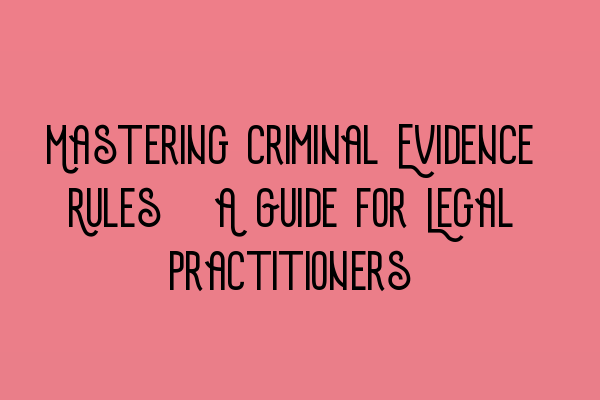Mastering Criminal Evidence Rules: A Guide for Legal Practitioners
Welcome to SQE Criminal Law & Practice Law UK, where we provide comprehensive resources for legal practitioners specializing in criminal law. In this blog post, we will guide you through the intricacies of mastering criminal evidence rules. Understanding these rules is crucial for building a strong defense or prosecution case and ensuring justice is served.
The Importance of Criminal Evidence Rules
Criminal evidence rules form the backbone of any criminal trial. They dictate what evidence can be presented, how it should be gathered, and the standards for admissibility. As a legal practitioner, having a deep understanding of these rules is essential for effectively representing your clients.
Key Concepts in Criminal Evidence Rules
Before delving into the specifics, let’s cover some key concepts you should be familiar with:
- Relevance: Evidence must be relevant to the case at hand. Understanding what evidence is admissible and how it relates to the issues in question is critical.
- Hearsay: Hearsay evidence is often inadmissible unless it falls under certain exceptions. Knowing how to effectively challenge or admit hearsay evidence can significantly impact the outcome of a case.
- Expert Witnesses: Expert witnesses can provide specialized knowledge that may assist the court in understanding complex issues. Understanding the rules surrounding expert opinion evidence is vital for leveraging their expertise effectively.
- Privilege: Privileged communications, such as those protected by attorney-client privilege or spousal privilege, are generally excluded from evidence. Knowing when privilege applies and how to assert or challenge it is crucial.
- Character Evidence: The rules governing character evidence play a significant role in criminal trials. Understanding when it can be admitted, and when it is prohibited, is essential for presenting a persuasive case.
Mastering Criminal Evidence Rules
To become a master of criminal evidence rules, it is crucial to stay updated with changes in legislation and important case law. Continuous professional development through SQE 1 Preparation Courses and SQE 2 Preparation Courses can help you sharpen your knowledge and stay well-versed in the subject.
At SQE Criminal Law & Practice Law UK, we understand the importance of practical training. That’s why we offer SQE 1 Practice Exam Questions and SQE 1 Practice Mocks FLK1 FLK2 to help you test your knowledge and prepare effectively for the upcoming SRA SQE Exam Dates.
Remember, practice makes perfect. By engaging with mock exams, quizzes, and rigorous preparation courses, you can enhance your understanding of criminal evidence rules and be well-prepared to handle any challenges that come your way.
For further information on SQE 1 and SQE 2 preparation, please visit our SQE 1 Preparation Courses and SQE 2 Preparation Courses pages.
Conclusion
Mastering criminal evidence rules is indispensable for legal practitioners specializing in criminal law. By familiarizing yourself with the key concepts and staying updated with relevant legislation and case law, you can provide the best representation for your clients.
At SQE Criminal Law & Practice Law UK, we are dedicated to helping you succeed. Take advantage of our resources, including SQE 1 Practice Exam Questions and SQE 1 Practice Mocks FLK1 FLK2, to enhance your knowledge and skills.
Good luck on your journey to mastering criminal evidence rules!
Related Articles:
SQE 1 Practice Exam Questions
SQE 1 Practice Mocks FLK1 FLK2
SQE 2 Preparation Courses
SQE 1 Preparation Courses
SRA SQE Exam Dates
